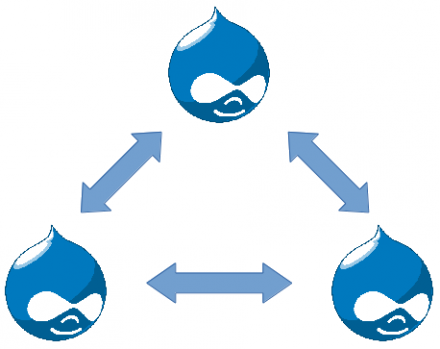The story of a historical character acquires a plethora of accretions over the centuries. We have numerous incidents and episodes in his or her life but not the complete picture. So, representing historical characters on stage could lead to a fractured narrative. There has to be synchronisation with the pre-recorded dialogue and it should not distract the actors from emoting.

The synchronisation is also of great significance in the digital scene. Content publishing in Drupal is of utmost importance with the expanding possibilities of content creation itself. It is even more crucial when it has to be synchronised between Drupal sites. Why is content synchronisation needed in Drupal?
Need for Content Synchronisation
Drupal 8 offers numerous tools for streamlining content creation and moderation. For instance, the Content Moderation module lets you expand on Drupal’s ‘unpublished’ and ‘published’ states for content and enables you to have a published version that is live and have a different working copy that is undergoing assessment before it is published.
In case, you need to share content or media across multiple sites, different solutions are available in Drupal that comes with content synchronisation capabilities to assist you to keep the development, staging and production in superb sync by automating the safe provisioning of content, code, templates and digital assets between them. Multiple synchronisation tasks can be created and scheduled for automating their occurrence in the future targeting different destinations servers and sites. Or, synchronisation tasks can be manually performed via the user interface.
Following are some of the major modules that are worth considering for content synchronisation necessities:
Deploy - Content Staging
The Deploy module enables users to easily stage content from one Drupal site to another and automatically governs dependencies between entities like node references. Its rich API is extensible that helps in different content staging situations. It is great for performing cross-site content staging. Using Deploy with RELAXed Web Services helps in staging content between different Drupal websites. It, also, works with Workspace module for offering workspace preview system for single site content staging. And the API offered by RELAXed Web Services is spectacular for building fully decoupled site. With Multiversion, all content entities can be revisioned. Workbench Moderation ensures that when you moderate a workspace, content is replicated automatically when approved.
Entity Share

Entity Sync module enables you to share entities like node, field collection, taxonomy, media etc. between Drupal instances. It lets you share entities with the help of JSON API and offers a user interface for leveraging endpoints provided by JSON API module.
CMS Content Sync

CMS Content Sync module offers content synchronisation functionalities between Drupal sites with the help of a NodeJS based Sync Core. The synchronisation of an enormous amount of data consisting of content and media assets is possible with the help of this module that can’t be managed by Drupal itself. It is wonderful for content staging as it enables you to test code updates with your content and publish code and content concurrently. It manages the publishing so that you can have a complete focus on the creation of content. It also offers content syndication functionalities and your entire content can be updated and deleted centrally. Moreover, it allows you to connect any of your sites to a Content Pool that lets you push your content and media items and the remote sites can be allowed to import that content easily.
Content Synchronisation
Exporting single content item or a number of content items from an environment to another efficaciously is possible with the help of Content Synchronisation module. That means you can export and import full site content. Or, you can export and import a single content item. The difference between site content and the one in YAML files can be viewed. Also, entities can be imported with a parent/child relationship.
Acquia Content Hub

The distribution and discovery of content from any source in order to a fantastic multi-channel digital experiences can be done using Acquia Content Hub module. It enables you to connect Drupal sites to the Acquia Content Hub service. Acquia Content Hub, which is cloud-based, centralised content dissemination and syndication solution, lets you share and enrich content throughout a network of content sources using extensible, open APIs.
Conclusion
These are some of the most significant solutions available in the enormous list of Drupal modules that are specifically built for enhancing synchronisation of content between Drupal sites.
We have been constantly working towards the provisioning of marvellous digital experiences with our expertise in Drupal development.
Let us know at [email protected] how you want us to help you build innovative solutions using Drupal.
Subscribe
Related Blogs
Back from DrupalCon Atlanta 2025: A Milestone Moment for OpenSense Labs

“Fit. Fast. Built to Last.” That wasn’t just a tagline, it was the mindset we brought to DrupalCon Atlanta 2025. And judging…
Explainable AI Tools: SHAP's power in AI

Do you know what are explainable AI tools? Explainable AI tools are programs that show how an AI makes its choices. They help…
AI Chatbot: Crafting with Precision & Personality

In the realm of artificial intelligence, developing an AI chatbot that not only delivers accurate information but also…




